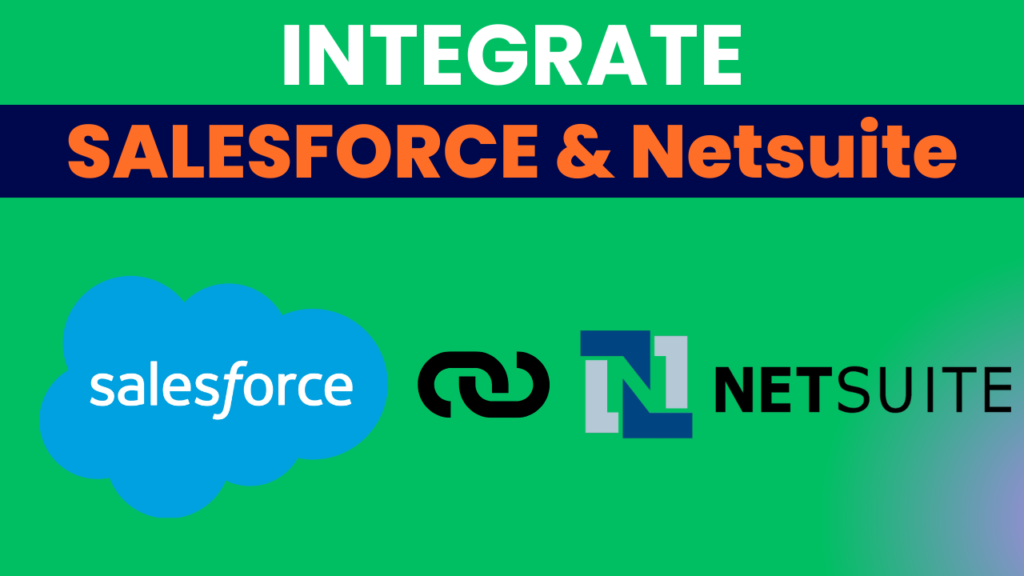Connecting NetSuite and Salesforce can dramatically improve operational efficiency, ensure data consistency, and foster stronger collaboration between sales and finance departments.
Are you experiencing challenges with:
- Keeping financial and customer data synchronized between NetSuite and Salesforce?
- Manual data entry between your CRM and ERP, resulting in errors and delays?
- Finding a suitable method to integrate NetSuite and Salesforce to optimize your business processes?
Choosing the appropriate integration strategy is essential for aligning with your company’s technical infrastructure and operational procedures. This discussion will explore three primary approaches to integrating these platforms, assisting you in determining the optimal solution for your organization.
3 Approaches To NetSuite And Salesforce Integration
Pre-Built NetSuite Salesforce Connectors
Pre-built connectors are ready-made solutions designed to integrate NetSuite and Salesforce, enabling seamless data exchange between these two prominent platforms.
These connectors establish a direct connection between NetSuite’s ERP capabilities and Salesforce’s CRM functionalities, facilitating smooth data transfer without complex manual interventions. A prime example of this type of connector is Breadwinner.
Real-Time Data Synchronization
Utilizing a pre-built connector like Breadwinner allows teams to synchronize vital data, including customer orders, invoices, payments, and financial reports, between the two systems instantly. This eliminates the need for employees to switch between platforms, saving valuable time and reducing the likelihood of errors associated with manual data entry.
Breadwinner is notable for its ability to automatically synchronize crucial financial data from NetSuite directly into Salesforce. Sales teams, for example, can access a customer’s financial status, such as outstanding balances, order history, and payment status, all within Salesforce.
This access to current financial information within the CRM empowers sales teams to make better-informed decisions during customer interactions, enhancing communication and improving the overall sales cycle.
Enhanced Interdepartmental Collaboration
Employing a native connector such as Breadwinner can improve collaboration between sales and finance departments. With both teams accessing the same accurate, real-time data, misunderstandings are minimized, and delays are reduced.
Finance teams can process orders and payments more efficiently, while sales teams can respond to customer inquiries more promptly, enhancing customer satisfaction and overall business outcomes.
Simplified Setup & Minimal Technical Requirements
The implementation of pre-built connectors is typically straightforward, requiring minimal technical expertise. Unlike more intricate integration methods, a native connector can be configured relatively quickly, making it an ideal choice for businesses seeking a swift and uncomplicated solution.
Breadwinner and similar tools often offer comprehensive support services to assist companies during implementation and ongoing usage, ensuring smooth operation.
Dependable & Low-Maintenance Solution
Pre-built connectors are also highly reliable, providing consistent data flow without extensive customization or continuous maintenance. They automatically ensure data synchronization, minimizing the risk of discrepancies between the two systems. This is particularly crucial for businesses where data accuracy and consistency are fundamental to daily operations.
iPaaS Solutions (Integration Platform as a Service)
iPaaS platforms offer a cloud-based method for connecting NetSuite and Salesforce, granting businesses greater control over data flow management between the two systems. These platforms enable companies to automate data synchronization between NetSuite and Salesforce while providing the flexibility to connect numerous other applications concurrently.
A key advantage of iPaaS platforms is their versatility. They allow businesses to create automated workflows triggered by specific business events, such as new sales orders or customer updates, ensuring data consistency across platforms. This level of automation can conserve time, minimize errors, and provide improved visibility into an organization’s data.
However, this adaptability can present certain challenges. Implementing an iPaaS integration often requires a higher level of technical proficiency. If an IT team lacks the necessary skills, the initial setup can be complex, and ongoing integration maintenance may require additional support.
iPaaS platforms are designed to connect a broad spectrum of applications, which can make them more intricate to manage than native connectors.
While iPaaS solutions provide a robust method for integrating systems, they might not offer the same simplicity and directness as a pre-built connector. Businesses that only need to connect NetSuite and Salesforce might find iPaaS platforms unnecessarily complex.
However, for organizations with broader integration needs, iPaaS offers a valuable, scalable solution.
Custom Development
For businesses with unique requirements that off-the-shelf solutions cannot fulfill, custom development provides a tailored approach to integrating NetSuite and Salesforce.
This method allows for the creation of a highly customized integration that aligns with an organization’s specific processes, workflows, and data needs.
The primary benefit of custom development is its capacity to address complex business scenarios. Whether it’s connecting NetSuite and Salesforce with other internal systems or developing specialized automation processes, custom development offers the flexibility to design a solution that meets all requirements.
However, custom development involves significant costs and resource investments. Developing an integration from the ground up requires a skilled team of developers who can design, build, and maintain the integration over time.
This makes custom development the most resource-intensive option, both in terms of initial implementation and ongoing maintenance. Businesses without a robust internal IT team or the budget to engage external developers may find it challenging to support this type of integration long-term.
Custom-built solutions necessitate ongoing attention. As systems evolve and expand, the integration may require regular updates and maintenance to ensure compatibility with new software versions or additional business requirements. This contributes to the total cost of ownership and should be factored into the evaluation process.
Custom development is suitable for companies with highly specific, complex needs that cannot be met by other integration methods. However, it is crucial to carefully consider the costs, time, and resources involved before choosing this approach.
NetSuite Salesforce Integration: Next Steps
When deciding on an approach for NetSuite Salesforce integration, it’s essential to consider a business’s specific needs, technical expertise, and budget.
For companies seeking a straightforward, easy-to-implement solution, pre-built connectors like Breadwinner offer reliability, ease of use, and rapid deployment.
iPaaS platforms offer greater flexibility for businesses with more complex workflows or those requiring integration with multiple applications. This solution is suitable for companies seeking a scalable, versatile approach, although it may necessitate greater technical expertise for implementation and maintenance.
Custom development is the optimal choice for businesses with highly specialized needs that cannot be addressed by standard connectors or iPaaS platforms. However, it involves higher costs and requires greater resources for ongoing maintenance.
Each method presents its own advantages and disadvantages, so it’s vital to assess a business’s objectives, capabilities, and resources before making a decision. A well-executed integration between NetSuite and Salesforce can enhance data accuracy, streamline operations, and improve collaboration between teams, ultimately leading to improved decision-making and enhanced business performance.







